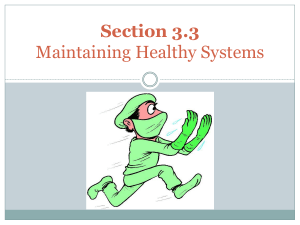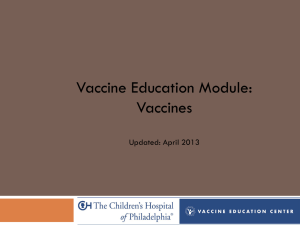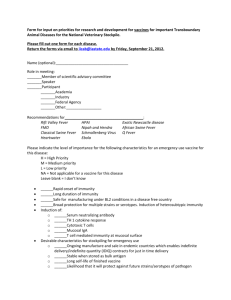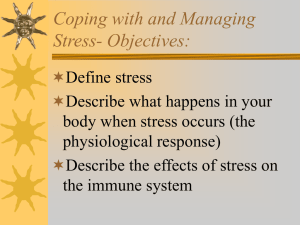Immunization Issues Do Multiple Vaccines Overwhelm the Immune
advertisement
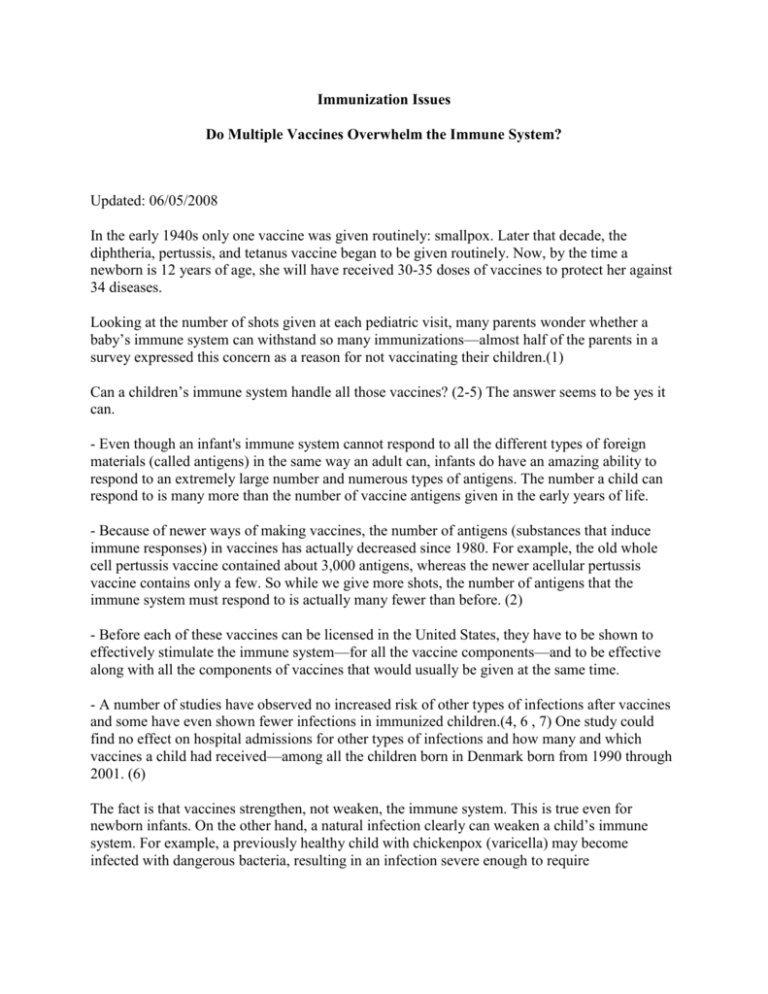
Immunization Issues Do Multiple Vaccines Overwhelm the Immune System? Updated: 06/05/2008 In the early 1940s only one vaccine was given routinely: smallpox. Later that decade, the diphtheria, pertussis, and tetanus vaccine began to be given routinely. Now, by the time a newborn is 12 years of age, she will have received 30-35 doses of vaccines to protect her against 34 diseases. Looking at the number of shots given at each pediatric visit, many parents wonder whether a baby’s immune system can withstand so many immunizations—almost half of the parents in a survey expressed this concern as a reason for not vaccinating their children.(1) Can a children’s immune system handle all those vaccines? (2-5) The answer seems to be yes it can. - Even though an infant's immune system cannot respond to all the different types of foreign materials (called antigens) in the same way an adult can, infants do have an amazing ability to respond to an extremely large number and numerous types of antigens. The number a child can respond to is many more than the number of vaccine antigens given in the early years of life. - Because of newer ways of making vaccines, the number of antigens (substances that induce immune responses) in vaccines has actually decreased since 1980. For example, the old whole cell pertussis vaccine contained about 3,000 antigens, whereas the newer acellular pertussis vaccine contains only a few. So while we give more shots, the number of antigens that the immune system must respond to is actually many fewer than before. (2) - Before each of these vaccines can be licensed in the United States, they have to be shown to effectively stimulate the immune system—for all the vaccine components—and to be effective along with all the components of vaccines that would usually be given at the same time. - A number of studies have observed no increased risk of other types of infections after vaccines and some have even shown fewer infections in immunized children.(4, 6 , 7) One study could find no effect on hospital admissions for other types of infections and how many and which vaccines a child had received—among all the children born in Denmark born from 1990 through 2001. (6) The fact is that vaccines strengthen, not weaken, the immune system. This is true even for newborn infants. On the other hand, a natural infection clearly can weaken a child’s immune system. For example, a previously healthy child with chickenpox (varicella) may become infected with dangerous bacteria, resulting in an infection severe enough to require hospitalization or even cause death. Similarly, a child with measles infection is more likely to develop middle ear infections. Infants and children are bombarded with germs every day in the air they breathe and the food they eat, but their immune systems are able to handle these exposures. The vaccines that are recommended for all children use only a small portion of the immune system’s “memory.” Scientists estimated that based on the immune system’s capacity to respond, a child could theoretically get 10,000 vaccines in one day and still not “use up” his or her immune ability to respond. (2) This Immunization Issues essay is an excerpt from the book Do Vaccines Cause That?! A Guide for Evaluating Vaccine Safety Concerns written by NNii authors Martin G. Myers and Diego Pineda. References 1. Daniel A. Salmon, PhD, MPH; Lawrence H. Moulton, PhD; Saad B. Omer, MBBS, MPH; M. Patricia deHart, ScD; Shannon Stokley, MPH; Neal A. Halsey, MD. Factors Associated With Refusal of Childhood Vaccines Among Parents of School-aged Children: A Case-Control Study. Arch Pediatr Adolesc Med. 2005;159:470-476. 2. Offit PA, Quarles J, Gerber MA, et al. 2002. Addressing parents concerns: do multiple vaccines overwhelm the infant’s immune system. Pediatrics. 109(1): 124-9. 3. Hilton S, Petticrew M, Hunt K. 2006. ‘Combined vaccines are like a sudden onslaught to the body’s immune system’: parental concerns about vaccine ‘overload’ and ‘immune vulnerability’. Vaccine 24: 4321-7. 4. Gregson AL, Edelman R. 2003. Does antigenic overload exist? The role of multiple immunizations in infants. Immunol Allergy Clin N Am. 23: 649-664. 5. Gellin BG, Maibach EW, Marcuse EK, et al. 2000. Do parents understand immunizations? A national telephone survey. Pediatrics 106(5): 1097-1102. 6. Hviid A, Wohlfahrt J, Stellfeld m, et al. 2005. Childhood vaccination and nontargetted infectious disease hospitalization. JAMA 294(6): 699-705. 7. Institute of Medicine Immunization Safety Review Committee. Multiple immunizations and immune dysfunction. National Academy Press, Washington, DC, 2002.
